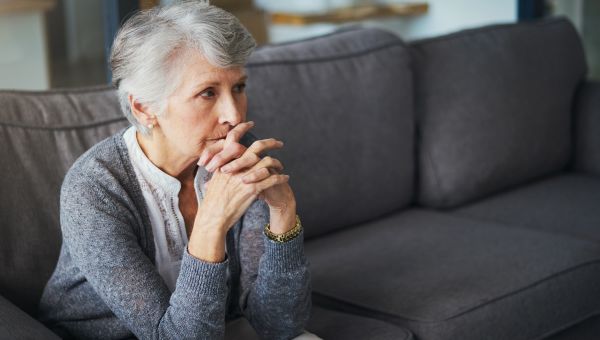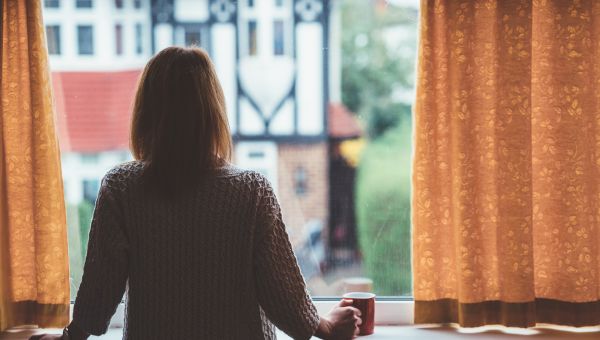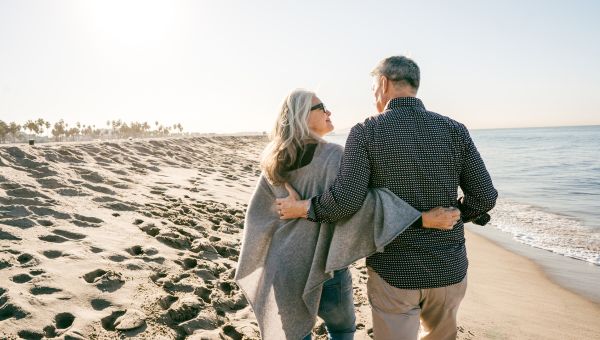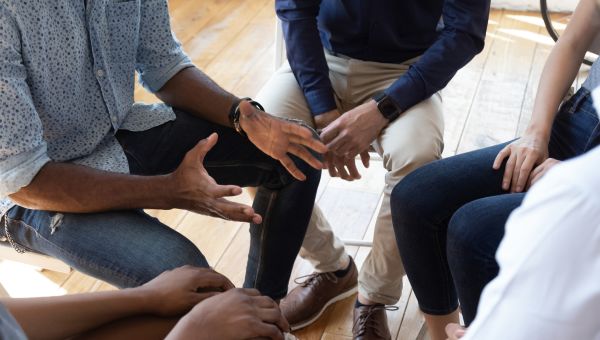Loneliness may be deadlier than obesity—and other shocking facts
About 42.6 million US adults over age 45 report chronic loneliness, but younger people may also be at risk.

On the surface, loneliness might not seem like much cause for concern. After all, you can’t see it the way you can a broken leg or an open wound. But loneliness is linked to serious physical and emotional effects—and it’s become a threat to public health. More than one third of older adults are lonely and 76 percent of lonely individuals say they have zero support people in their lives, according to the AARP.
Older adults aren't the only ones at risk. A 2018 Cigna-conducted study of 20,000 US adults ages 18 or older found that 47 percent of Americans feel lonely or left out some or most of the time. A year later, an online YouGov poll of 1,254 adults found that 30 percent of millennial respondents often or always felt lonely—and 22 percent reported having no friends at all.
Loneliness isn’t the same thing as being alone. Rather, it’s a feeling of loss or sadness due to a lack of meaningful social connections. If you feel lonely, don’t shrug it off or think you just have to accept it. Here’s what you need to know about the loneliness epidemic, plus strategies for finding and building strong relationships.

Who’s at risk for loneliness?
People at risk for loneliness include:
- Unpaid care givers
- People who have recently lost a spouse
- The elderly
- Those with chronic illnesses, especially people who are bed-bound
- Women (more likely to report loneliness than men)
Younger adults are feeling increasingly isolated as well. The population known as Generation Z—adults between the ages of 18 and 22—and Millennials—ages 23 to 37—recorded the highest scores for loneliness and claim to be in worse health, according to the results of a 2018 online survey conducted by Cigna. Responses from the survey indicate that many younger adults feel that people around them are not really with them and that no one truly knows them.
Introverts—people who can feel satisfied when alone and who may find social situations exhausting—are also at higher risk for becoming lonely. This may come as a surprise since introverts are often incorrectly assumed to be “loners” or anti-social. This can be true, but often isn’t the case. Introverts simply tend to prefer deep connections over superficial ones.

Loneliness may be deadlier than obesity
A growing number of studies suggest loneliness raises a person’s risk of dying early. But a 2017 analysis of 148 previous studies demonstrates just how great that risk is.
Researchers discovered lonely people had a 50 percent higher chance of premature death, compared with those who had strong support networks. That means loneliness may be deadlier than obesity, which increases death risk before age 70 by about 30 percent.
Lonely people are also more prone to chronic illnesses, such as high blood pressure, heart disease and dementia. Isolation raises heart attack risk by 29 percent and stroke risk by 32 percent, as well—that’s almost the same amount as smoking.

Social isolation is physically painful
One study involving over 3,000 adults found people who lived alone or who only had superficial relationships were more likely to develop chronic pain. Other research suggests loneliness can intensify pain and stress among people with fibromyalgia.
How? Loneliness hurts your body’s ability to regulate stress hormones. That can increase chronic, system-wide inflammation. Inflammation can then aggravate certain painful conditions like fibromyalgia. Solitude also ups your risk of depression, which can involve surprising physical symptoms like back pain and achiness.
If you have chronic pain—and your doctor says it’s appropriate for your condition—consider group physical therapy sessions. Group classes may boost your activity level and help to ease pain, while also letting you meet new people.

The lonelier you get, the more antisocial you may become
Do you turn down invitations even though you’re craving friendship? Isolated people tend to separate themselves further by shying away from social activities. They’re less likely to attend religious services, volunteer and show up to family events than non-lonely people, according to the AARP.
If your self-esteem’s taken a hit, or your social skills feel rusty from being on your own for so long, give yourself room to make mistakes. Awkward moments are a part of life. Every relationship includes stupid comments, embarrassments and times when you’re simply out of sync.
One way to sidestep awkward silences and tongue slips when a friendship’s starting out is to meet for activities, rather than meals. Some ideas: Go for a walk in the park, take a yoga class, attend a small concert. Activities can help conversations come up naturally, instead of being forced while you’re waiting for food.

Sleep deprivation can worsen loneliness
Sleep influences your mental and physical health in remarkable ways. For example, a chronic lack of sleep can:
- Up your odds of anxiety and depression
- Encourage weight gain
- Raise your risk of chronic illnesses like high blood pressure and diabetes
It can also worsen the emotional effects of loneliness. According to the AARP, over half of those who got just three-to-five hours of sleep each night reported feeling alone, compared to 32 percent of people who got eight-to-ten hours of sleep nightly.

Retired people are actually less lonely
Working people might interact with customers and coworkers all day, but they’re still more likely to feel alone, compared to retired people. Thirty percent of retirees report loneliness, versus 37 percent of working people, according to the AARP.
One possible explanation: Office small talk may not foster feelings of connectedness. One psychology experiment found people who favored deep conversations were happier than those who tended towards superficial ones. Researchers recorded the conversations of 47 women over four days, analyzed the recordings, and then compared their findings against the women’s happiness scores. The happiest women had about twice the number of deep conversations, compared to unhappy women and engaged in small-talk about three times less often.
Even if you work in a fast-paced environment, make time for at least one “real” interaction per day. If you can’t fit it in during working hours, invite an office pal to an exercise class or the occasional happy hour after clocking out.

Money might buy happiness after all
In a survey by the AARP, people in the highest income bracket—those earning more than $75,000 annually—were less likely to report loneliness than those in the lowest bracket—people earning less than $25,000 annually. In fact, about half of low-income people said they felt alone, compared to 29 percent of wealthier individuals.
People with higher incomes may be able to afford a wider range of social activities, such as eating out or taking trips, but there are still many exciting social activities you can do on a budget:
- Join a faith group, which is a free way to meet friends and a proven way to help you live longer.
- Start a low-cost hobby, such as gardening, painting or joining a local chess or Scrabble league.
- Enjoy lavish dinners, minus the price tag by hosting potlucks or starting a meal club with friends.

How to ease loneliness
Volunteering is a great way to make connections because:
- It can involve smaller, more intimate groups.
- You’ll probably meet like-minded people.
- Talking about the cause can foster genuine conversations. (Find a cause you care about.)
A pet can provide companionship and affection when you need it most—not to mention, they can get you out of the house and help you meet fellow animal lovers. (Visit the ASPCA adoption center.)
Other ways to make connections:
- Join a Meetup group.
- Find an online support group for your medical condition.
- Get elderly companion care through the Visiting Angels organization.

When to Seek Professional Help
When loneliness just won’t go away, speaking with a healthcare provider may help. Reach out to your primary care physician or a therapist, who can discuss your feelings and suggest options for treatment.
If you’re lonely and are having thoughts of suicide, don’t wait to talk to a professional. Seek medical assistance immediately. Head to an emergency room or call, text, or chat 988 to reach the 988 Suicide & Crisis Lifeline.
More On


video

article

slideshow


video


video
